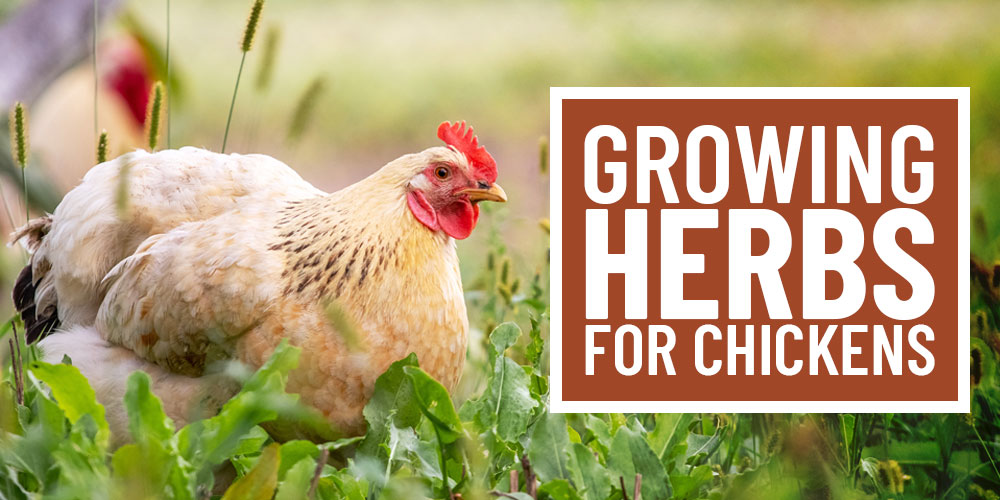
NAVIGATION
Whether you’re a fan of chicken feed, free-ranging, a chicken garden, or all three, growing herbs for chickens is a great way to supplement your flock’s diet with fresh nutrition. Many herbs and spices are packed with health benefits for your little foragers, so getting familiar with which herbs are the safest and healthiest for your brood is key when starting out.
Hi, I’m Ryan
My years as a homesteader have taught me that using your crops and chickens to benefit each other will save you time and money while promoting the health of your flock. Growing herbs for chickens can increase egg production, repel insects, and add fresh aromas to your garden or kitchen.

The Top 5 Best Herbs for Your Chickens
Cilantro | Parsley | Basil | Ginger | Cinnamon
Why Should I Grow Herbs For Chickens To Eat?

On top of providing nutrition, growing herbs for laying hens can repel unwanted insects and predators and improve the appearance of your chickens and eggs. It’s crazy that so many of the spices we cook with are actually herbs chickens can eat, and I love taking advantage of this.
If you already grow fresh herbs and poultry spices to use in your recipes, plant some extra for your chickens. You can even plant them in or around your chicken coop itself.
What Herbs Are Safe For Chickens To Eat?

Most herbs are good for your chickens, and whether you’re wanting to grow herbs for chicken health or herbs to increase egg production in chickens, it’s almost hard to go wrong. That said, some herbs have specific benefits and drawbacks, and a few are actually dangerous for chickens, so I’ve created a chart for determining the best herbs for chickens.
As you decide which herbs to grow, keep in mind that this list is based on my personal experience and the experience of other homesteaders, so if you’re ever unsure about something, always ask your veterinarian.
| Herbs | Safe For Chickens | Promotes Egg Laying | Safe For Baby Chicks | Notes |
|---|---|---|---|---|
| Cilantro | Yes | Yes | Yes | Vitamins A, E, C, K |
| Parsley | Yes | Yes | Yes | Vitamins A, B, B12, C, K |
| Basil | Yes | Yes | Yes | Antibacterial |
| Ginger | Yes | Yes | Yes | Stress reducer |
| Cinnamon | Yes | Yes | No | Use in moderation |
| Rosemary | Yes | Yes | Yes | Deodorizes Coop |
| Dill | Yes | Yes | No | Use in moderation |
| Chives | Yes | Yes | No | Use in moderation |
| Lavender | Yes | Yes | No | Relaxing and calming |
| Oregano | Yes | Yes | Yes | Immune support |
| Fennel | Yes | Yes | No | Increased Egg Production |
| Lemon Balm | Yes | No | Yes | Immune system booster |
| Sage | Yes | No | No | Antioxidant |
| Thyme | Yes | No | Yes | Antibiotic |
| Catnip | Yes | No | Yes | Calming effects |
| Turmeric | Yes | Yes | Yes | Reduces pain and inflammation |
| Borage | Yes | No | Yes | Vitamins A, C |
| Cayenne Pepper | Yes | No | Yes | Improves circulation |
| Horseradish | No | No | No | Chickens don’t like it |
| Lemon Grass | Yes | No | No | Vitamins A, C |
| Peppermint | Yes | Yes | Yes | Lowers body temperature |
| Spearmint | Yes | Yes | Yes | Repels pests |
| Wasabi | Yes | No | No | Anti-inflammatory |
| Black Pepper | Yes | Yes | No | Boosts Egg Production |
| Chicory | Yes | No | Yes | Dense vitamins and minerals |
| Coriander | Yes | No | Yes | Anti-inflammatory |
| Curry | Yes | No | Yes | Can alter egg taste |
| Nutmeg | Yes | No | No | Must be ground or powdered |
| Sorrel | Yes | No | No | Antioxidant |
| Cardamom | Yes | Yes | No | Vitamins A, C |
| Cumin | Yes | Yes | No | Antiviral |
| Tarragon | Yes | Yes | Yes | Appetite stimulant |
| Anise | Yes | No | No | Prevents disease |
| Lemon Verbena | Yes | No | Yes | Antiviral |
| Lovage | Yes | No | No | Immune health |
| Marjoram | Yes | Yes | No | Antibacterial |
| Paprika | Yes | No | No | Enhances yolk coloring |
| Poppy Seed | Yes | Yes | Yes | Good source of protein |
| Bay Leaf | Yes | No | No | Immune support |
| Caraway | Yes | No | No | Iron, magnesium, and calcium |
| Celery Seed | Yes | No | No | Promotes red blood cell formation |
| Chili Pepper | Yes | No | No | Natural de-wormer |
| Clove | Yes | No | No | Anti-inflammatory |
| Sesame | Yes | No | No | In moderation, high fat |
| Star Anise | Yes | Yes | No | Can help prevent parasites |
| White Mustard | Yes | No | Yes | A favorite for chickens |
What Are The Best Herbs For Raising Chickens?

As you can see from the chart above, there are many herbs that are good for chickens, but I like to stick to the ones that pack the most powerful punch of vitamins, minerals, and other healthy nutrients. Most of these herbs can be given fresh or dried, but, while you can definitely make dried herbs for chickens to eat, almost all herbs have better health benefits when eaten fresh.
Can Chickens Eat Cilantro?
Not only can chickens eat cilantro, they love it! Whether you’re the type of person who thinks cilantro is the queen of herbs or the kind that thinks it tastes like soap, this herb is packed with vitamins (A, E, C, and K) and provides amazing support for your flock’s immune system and bone health.
I like giving cilantro to my hens when it’s fresh so they get the full benefits. Cilantro promotes healthy tissue growth, so it’s particularly good for baby chicks, and it also aids digestion, being high in fiber, zinc, potassium, calcium, and magnesium with antioxidant and antiparasitic qualities.
Can Chickens Eat Parsley?
Containing vitamins A, B, B12, C, and K, parsley is good for your chickens to eat because it aids their circulation, bone health, growth, egg laying, and digestion. This herb is one of my favorites for chickens because it helps lower stress and is rich in iron and calcium. A biannual herb, parsley is moderately easy to grow, needing moist soil and lots of sunlight.
Can Chickens Eat Basil?
Chickens can definitely eat basil, and I like planting it around my garden and chicken coop because it acts as a natural insect repellant. With antibacterial, anti-inflammatory, and antioxidant properties, basil is also good for your hens’ livers. That said, this is a tricky little herb to grow, requiring warm weather and frequent trimming.
Can Chickens Eat Ginger?
Oh yes! Ginger is uniquely good for your flock thanks to its ability to give them better circulation in the winter months, and it is also known to reduce stress, and stimulate appetite. When you add the antioxidants, calcium, and vitamins B and C, this herb is a no-brainer to feed your chickens.
Can Chickens Eat Cinnamon?
While chickens can eat cinnamon, moderation is key as too much of this spice can be harmful. I still count this as one of the best herbs to feed chickens, though, because it is an antiparasitic, antifungal, antibacterial, anti-inflammatory, and antioxidant herb packed with vitamins A, B, K, magnesium, iron, and potassium.
Can Chickens Eat Rosemary?
Despite its strong taste and smell, rosemary is an herb your chickens can eat, and it has the added bonuses of deodorizing your coop, repelling insects, and acting as a pain reliever at the same time. Good for respiratory and liver health, rosemary also has antibacterial, antimicrobial, antifungal, and antioxidant properties, while containing vitamins A, B, C and minerals such as magnesium, calcium, copper, iron, and manganese.
Can Chickens Eat Dill?
Dill is safe for chickens to eat in moderation. This herb promotes respiratory health and is high in B1, B2, B3, B5, A, C, folate, antioxidants, protein, manganese, iron, calcium, magnesium, and zinc. I’m careful not to give too much dill to my chickens, though, as the sodium content can easily get too high for them.
Can Chickens Eat Chives?
If you’re needing to improve your hens’ egg production, gut health, and immune systems, your chickens can eat chives. Chives are high in fiber and vitamin A, but they can cause health issues in your flock if eaten too much, or even make their eggs taste like onions. Give sparingly, and make sure you chop them well to avoid choking.
Can Chickens Eat Lavender?
Chickens can eat lavender, but even just adding this herb to your coop and nesting boxes can help to repel pests and promote healthy relaxation among your laying hens to boost egg production. Like many others, this herb is only beneficial in moderation, but in small amounts it can improve circulation in your hens. I like that this herb is a perennial, but it is picky with its soil and how often it requires water.
Can Chickens Eat Oregano?
Oregano is one of the best herbs your chickens can eat, as it functions as a natural antibiotic while also having antiparasitic, antifungal, antioxidant, antibacterial, and anti-inflammatory properties. I give oregano to my flock to boost their immune system and help them fight common chicken diseases such as salmonella, avian flu, and E. coli. This herb is a perennial, but it doesn’t spread.
Can Chickens Eat Fennel?
Chickens can eat small amounts of fennel. If you give your flock too much of this herb it can be toxic, but I include it in this list because, given moderately, it’s actually really good for their reproductive health, acting as a powerful laying stimulant to help increase egg production. Fennel also contains vitamin C, protein, calcium, phosphorus, manganese, iron, and zinc.
Can Chickens Eat Lemon Balm?
Chickens can absolutely eat lemon balm. Growing lemon balm for chickens is a great way to supplement your flock’s nutrition as it provides a tasty treat they will gobble down while also containing polyphenols which are great immune system boosters.
Can Chickens Eat Sage?
Your chickens can eat fresh sage for a boost of vitamins (A, C, E, and K), antioxidants, and minerals (zinc, magnesium, and copper). Growing sage for chickens can protect your flock from common poultry diseases and is particularly good for bone health.
Can Chickens Eat Thyme?
Like oregano, thyme is a natural antibiotic, and chickens can eat this herb to improve their respiratory heath and immune system while also benefiting from its antibacterial and antiparasitic properties. I love thyme in particular because it’s a low-maintenance, easy-to-grow perennial that spreads easily and can even thrive in cold weather.
Can Chickens Eat Catnip?
We all know what cats think about catnip, but it turns out chickens love it too! A natural insecticide, this herb is easy to grow, but it will overtake your garden if you don’t harvest it often. Not much is known about the nutritional value of catnip, but it is said to have a calming effect on chickens, and it provides a natural treat for them. This one is safe in any form for chickens over six weeks old, but give it sparingly.
Can Chickens Eat Turmeric?
In small amounts, turmeric is a great spice for chickens to eat. A natural pain and inflammation reliever, turmeric is beneficial to your hens’ immune systems, eyes, brains, and digestion. This herb is also high in vitamins B and E.
Can Chickens Eat Borage?
While chickens (and humans) can eat all parts of the borage plant, it primarily provides pretty blue flowers chickens can eat. This herb thrives in the spring and summer months, and functions as a great boost for chickens recovering from the respiratory issues caused by cold weather. Packed with vitamins A and C as well as beta-carotene, borage is great for the health of your chickens and their eggs.
Can Chickens Eat Cayenne Pepper?
Spicy foods don’t affect chickens like they do us humans, so chickens can happily eat cayenne pepper. This herb fights bacteria, and I like the rich color it gives the egg yolks. You might consider supplementing your flock’s diet with this spice during the winter to help with circulation and boosting their immunity with vitamins A, B, and C, along with potassium and magnesium.
Can Chickens Eat Horseradish?
Horseradish won’t kill your chickens if they decide to eat some, but most chickens avoid it. If eaten too much, horseradish can really irritate your flock’s stomachs, so it’s probably better to leave this one alone.
Can Chickens Eat Lemon Grass?
Chickens can eat lemon grass in moderation, and growing lemongrass for chickens is an excellent way of packing vitamins A and C into your flock’s diet. The high fiber content in this herb will make it particularly hard for your hens to digest, though, so I’m always careful to give it in small amounts paired with protein.
Can Chickens Eat Peppermint?
If you want to grow some mint, your chickens can 100% eat it and will benefit from its calming properties. An easy-to-grow perennial, mint repels mice and insects and lowers the body temperature of your laying hens during the warmer months.
Can Chickens Eat Spearmint?
Just like peppermint, spearmint is perfectly safe for your baby chicks and mama hens to gobble up, and growing this herb has the added benefit of adding a nice scent to your garden or coop. If you’re a fan of spearmint, use this herb for a cozy evening tea for yourself as well!
Can Chickens Eat Wasabi?
Chickens can and will eat wasabi, which comes from the plant stem of the Wasabia japonica plant. This herb has antibacterial and anti-inflammatory properties and is known to promote bone and brain health. While wasabi isn’t toxic for your flock, I only give this one in very small amounts as its intense flavor might mess with their stomachs.
Can Chickens Eat Black Pepper?
Your laying chickens and your baby chicks can eat black pepper to help fight coughs and respiratory issues and protect against inflammation and harmful bacteria. This common herb is packed with vitamins A, E, K, B1, B2, B5, and B6, so it really is an amazing addition to your flock’s diet.
Can Chickens Eat Chicory?
Chicory is one of the best things your chickens can eat. Great for your flock’s heart, gut, and liver health, chicory builds the immune system of your hens with high levels of vitamins A, B6, C, E, and K as well as the minerals zinc, magnesium, calcium, manganese, iron, folic acid, and potassium.
Can Chickens Eat Coriander?
Coriander comes from the same plant as cilantro, so chickens can definitely eat this herb in moderation. Coriander is the dried seeds of this plant and has many of the same health benefits as the cilantro leaves and stems. I like this herb best for its strong anti-inflammatory benefits.
Can Chickens Eat Curry?
Since spicy, strong-flavored foods don’t affect hens’ taste buds like they do ours, chickens can eat curry without being bothered by the flavor. Curry contains calcium, iron, and potassium, but any strong-smelling, strong-tasting herb like this one can alter the taste of eggs, so you’ll want to be careful how much you feed to your laying hens.
Can Chickens Eat Nutmeg?
Chickens don’t tend to love nutmeg, but they can eat it in powdered or ground form. If you want to give some to your flock for its anti-inflammatory, antibacterial, and antioxidant properties, you can add some powdered nutmeg into their other feed as a disguised nutritional boost.
Can Chickens Eat Sorrel?
A lettuce-like herb, sorrel is an antioxidant-rich herb your chickens can eat in moderation. Large amounts can be dangerous because of sorrel’s oxalic acid content, but this herb grows easily in the wild, and chickens love it for a tasty snack.
Can Chickens Eat Cardamom?
Yes, cardamom is safe for chickens to eat! Mixing ground pods in with your flock’s daily feed is a great way to improve the diet and production of your laying hens with vitamins A and C and numerous minerals and antioxidants.
Can Chickens Eat Cumin?
Chickens can eat black cumin for its antibacterial and antiviral properties, and some believe that this spice can help boost egg production while improving egg quality.
Can Chickens Eat Tarragon?
One of the best herbs for chicken health, tarragon is definitely safe for your chickens to eat and actually acts as an appetite stimulant. Tarragon is a mega nutrition boost containing potassium, protein, magnesium, calcium, iron, vitamin B6, C, and D.
Getting Started Growing Herbs For Chicken Health And Egg Production

If you’re ready to get started and want to jump in quickly, learning some strategies for supplying your chickens’ nutritional needs without traditional feed is the best place to start. I have a post on how to do just that, and I can even help you with starting your own chicken garden combo which provides even more options for feeding herbs to your hens.
Your Turn!
- If you’ve given any herbs to your chickens, which ones have they liked the best?
- If you’re just starting out, which herbs do you want to try planting first?













Hi,
Sorry Hun, I am not a farm girl at this point..my chickens are in the freezer & packaged at the grocery store. But the news is lab grown chicken…which is strange, like cloning people, these days…so, when real chicken is no linger avaliable at the market, Then I will become a vegetarian